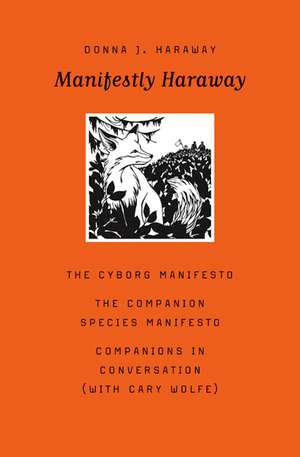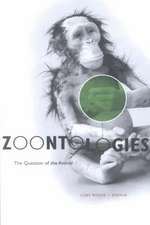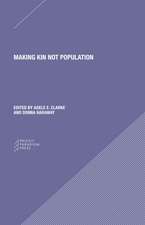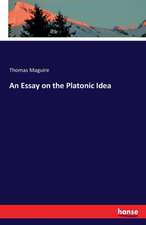Manifestly Haraway: Posthumanities, cartea 37
Autor Donna J. Haraway Prefață de Cary Wolfeen Limba Engleză Paperback – apr 2016
Electrifying,
provocative,
and
controversial
when
first
published
thirty
years
ago,
Donna
Haraway’s
“Cyborg
Manifesto”
is
even
more
relevant
today,
when
the
divisions
that
she
so
eloquently
challenges—of
human
and
machine
but
also
of
gender,
class,
race,
ethnicity,
sexuality,
and
location—are
increasingly
complex.
The
subsequent
“Companion
Species
Manifesto,”
which
further
questions
the
human–nonhuman
disjunction,
is
no
less
urgently
needed
in
our
time
of
environmental
crisis
and
profound
polarization.
Manifestly Harawaybrings together these momentous manifestos to expose the continuity and ramifying force of Haraway’s thought, whose significance emerges with engaging immediacy in a sustained conversation between the author and her long-term friend and colleague Cary Wolfe. Reading cyborgs and companion species through and with each other, Haraway and Wolfe join in a wide-ranging exchange on the history and meaning of the manifestos in the context of biopolitics, feminism, Marxism, human–nonhuman relationships, making kin, literary tropes, material semiotics, the negative way of knowing, secular Catholicism, and more.
The conversation ends by revealing the early stages of Haraway’s “Chthulucene Manifesto,” in tension with the teleologies of the doleful Anthropocene and the exterminationist Capitalocene. Deeply dedicated to a diverse and robust earthly flourishing,Manifestly Harawaypromises to reignite needed discussion in and out of the academy about biologies, technologies, histories, and still possible futures.
Manifestly Harawaybrings together these momentous manifestos to expose the continuity and ramifying force of Haraway’s thought, whose significance emerges with engaging immediacy in a sustained conversation between the author and her long-term friend and colleague Cary Wolfe. Reading cyborgs and companion species through and with each other, Haraway and Wolfe join in a wide-ranging exchange on the history and meaning of the manifestos in the context of biopolitics, feminism, Marxism, human–nonhuman relationships, making kin, literary tropes, material semiotics, the negative way of knowing, secular Catholicism, and more.
The conversation ends by revealing the early stages of Haraway’s “Chthulucene Manifesto,” in tension with the teleologies of the doleful Anthropocene and the exterminationist Capitalocene. Deeply dedicated to a diverse and robust earthly flourishing,Manifestly Harawaypromises to reignite needed discussion in and out of the academy about biologies, technologies, histories, and still possible futures.
Din seria Posthumanities
-
 Preț: 220.24 lei
Preț: 220.24 lei -
 Preț: 188.33 lei
Preț: 188.33 lei -
 Preț: 162.02 lei
Preț: 162.02 lei -
 Preț: 123.92 lei
Preț: 123.92 lei -
 Preț: 132.16 lei
Preț: 132.16 lei -
 Preț: 170.61 lei
Preț: 170.61 lei -
 Preț: 215.67 lei
Preț: 215.67 lei -
 Preț: 112.18 lei
Preț: 112.18 lei -
 Preț: 171.91 lei
Preț: 171.91 lei -
 Preț: 185.87 lei
Preț: 185.87 lei -
 Preț: 185.21 lei
Preț: 185.21 lei -
 Preț: 145.56 lei
Preț: 145.56 lei -
 Preț: 169.30 lei
Preț: 169.30 lei -
 Preț: 107.72 lei
Preț: 107.72 lei -
 Preț: 146.17 lei
Preț: 146.17 lei -
 Preț: 154.57 lei
Preț: 154.57 lei -
 Preț: 178.55 lei
Preț: 178.55 lei -
 Preț: 214.29 lei
Preț: 214.29 lei -
 Preț: 155.48 lei
Preț: 155.48 lei -
 Preț: 169.70 lei
Preț: 169.70 lei -
 Preț: 153.60 lei
Preț: 153.60 lei -
 Preț: 186.23 lei
Preț: 186.23 lei -
 Preț: 179.48 lei
Preț: 179.48 lei -
 Preț: 187.41 lei
Preț: 187.41 lei -
 Preț: 304.84 lei
Preț: 304.84 lei -
 Preț: 120.18 lei
Preț: 120.18 lei -
 Preț: 242.71 lei
Preț: 242.71 lei -
 Preț: 187.73 lei
Preț: 187.73 lei -
 Preț: 138.99 lei
Preț: 138.99 lei -
 Preț: 185.76 lei
Preț: 185.76 lei -
 Preț: 216.24 lei
Preț: 216.24 lei -
 Preț: 224.90 lei
Preț: 224.90 lei -
 Preț: 218.74 lei
Preț: 218.74 lei -
 Preț: 223.55 lei
Preț: 223.55 lei -
 Preț: 222.01 lei
Preț: 222.01 lei -
 Preț: 198.89 lei
Preț: 198.89 lei -
 Preț: 222.18 lei
Preț: 222.18 lei -
 Preț: 209.96 lei
Preț: 209.96 lei -
 Preț: 178.37 lei
Preț: 178.37 lei -
 Preț: 234.86 lei
Preț: 234.86 lei -
 Preț: 204.11 lei
Preț: 204.11 lei -
 Preț: 208.36 lei
Preț: 208.36 lei -
 Preț: 223.55 lei
Preț: 223.55 lei -
 Preț: 230.95 lei
Preț: 230.95 lei -
 Preț: 170.98 lei
Preț: 170.98 lei - 19%
 Preț: 99.50 lei
Preț: 99.50 lei
Preț: 111.14 lei
Nou
Puncte Express: 167
Preț estimativ în valută:
21.27€ • 22.12$ • 17.56£
21.27€ • 22.12$ • 17.56£
Carte disponibilă
Livrare economică 24 martie-07 aprilie
Livrare express 08-14 martie pentru 46.53 lei
Preluare comenzi: 021 569.72.76
Specificații
ISBN-13: 9780816650484
ISBN-10: 0816650489
Pagini: 224
Ilustrații: 9
Dimensiuni: 133 x 203 x 36 mm
Greutate: 0.39 kg
Ediția:1
Editura: University of Minnesota Press
Colecția Univ Of Minnesota Press
Seria Posthumanities
ISBN-10: 0816650489
Pagini: 224
Ilustrații: 9
Dimensiuni: 133 x 203 x 36 mm
Greutate: 0.39 kg
Ediția:1
Editura: University of Minnesota Press
Colecția Univ Of Minnesota Press
Seria Posthumanities
Notă biografică
Donna J. Haraway is distinguished professor emerita in the History of Consciousness Department at the University of California, Santa Cruz, where she is also affiliated with the departments of anthropology, feminist studies, environmental studies, and film and digital media. She is an active participant in UCSC’s Science and Justice Research Center and the Center for Cultural Studies.
Cary Wolfe is Bruce and Elizabeth Dunlevie Professor of English at Rice University, where he is also founding director of 3CT (Center for Critical and Cultural Theory). His books Zoontologies: The Question of the Animal, The Other Emerson (with Branka Arsic), and What Is Posthumanism? are published by Minnesota.
Cary Wolfe is Bruce and Elizabeth Dunlevie Professor of English at Rice University, where he is also founding director of 3CT (Center for Critical and Cultural Theory). His books Zoontologies: The Question of the Animal, The Other Emerson (with Branka Arsic), and What Is Posthumanism? are published by Minnesota.
Cuprins
Contents
Introduction
Cary Wolfe
The Manifestos
A Cyborg Manifesto: Science, Technology, and Socialist-Feminism in the Late Twentieth Century
The Companion Species Manifesto: Dogs, People, and Significant Otherness
Companions in Conversation
Donna J. Haraway and Cary Wolfe
Acknowledgments
Index
Introduction
Cary Wolfe
The Manifestos
A Cyborg Manifesto: Science, Technology, and Socialist-Feminism in the Late Twentieth Century
The Companion Species Manifesto: Dogs, People, and Significant Otherness
Companions in Conversation
Donna J. Haraway and Cary Wolfe
Acknowledgments
Index
Recenzii
"The
social
relations
of
science
was
a
whole
movement
in
the
1930s...It
did
not
survive
the
cold
war
purges
of
intellectual
life.
Science
studies
has
reinvented
many
of
its
themes
and
in
many
ways
improved
upon
them.
Yet
perhaps,
as
Haraway
once
noted
in
passing,
the
“liberal
mystification
that
all
started
with
Thomas
Kuhn…”
has
erased
a
little
too
much
of
its
radical
past.
We
are
very
fortunate
that
Donna
Haraway
and
her
kith
reinvented
it."—Public
Seminar
"Unusual and exciting. Every word adds a new detail, facet, nuance, reflection, to an infinitely detailed, faceted, nuanced reality."—London Review of Books
"Manifestly Haraway isa timely and necessary publication in response to our own political moment if we are to link up with past failures, and explore new affinities for the future."—Arcadia
"Widely influential."—Science Fiction Studies
"Important, feminist, bio-political work."—Annals of Science
"Manifestly Harawayis illuminating and engaging. Donna Haraway contextualizes the manifestos and considers how some of these early ideas are developing alongside fresh concepts and influences." —Sociology
"Unusual and exciting. Every word adds a new detail, facet, nuance, reflection, to an infinitely detailed, faceted, nuanced reality."—London Review of Books
"Manifestly Haraway isa timely and necessary publication in response to our own political moment if we are to link up with past failures, and explore new affinities for the future."—Arcadia
"Widely influential."—Science Fiction Studies
"Important, feminist, bio-political work."—Annals of Science
"Manifestly Harawayis illuminating and engaging. Donna Haraway contextualizes the manifestos and considers how some of these early ideas are developing alongside fresh concepts and influences." —Sociology
Descriere
Electrifying, provocative, and controversial when first published thirty years ago, Donna Haraway’s “Cyborg Manifesto” is even more relevant today, when the divisions that she so eloquently challenges—of human and machine but also of gender, class, race, ethnicity, sexuality, and location—are increasingly complex. The subsequent “Companion Species Manifesto,” which further questions the human–nonhuman disjunction, is no less urgently needed in our time of environmental crisis and profound polarization.
Manifestly Haraway brings together these momentous manifestos to expose the continuity and ramifying force of Haraway’s thought, whose significance emerges with engaging immediacy in a sustained conversation between the author and her long-term friend and colleague Cary Wolfe. Reading cyborgs and companion species through and with each other, Haraway and Wolfe join in a wide-ranging exchange on the history and meaning of the manifestos in the context of biopolitics, feminism, Marxism, human–nonhuman relationships, making kin, literary tropes, material semiotics, the negative way of knowing, secular Catholicism, and more.
The conversation ends by revealing the early stages of Haraway’s “Chthulucene Manifesto,” in tension with the teleologies of the doleful Anthropocene and the exterminationist Capitalocene. Deeply dedicated to a diverse and robust earthly flourishing, Manifestly Haraway promises to reignite needed discussion in and out of the academy about biologies, technologies, histories, and still possible futures.
Manifestly Haraway brings together these momentous manifestos to expose the continuity and ramifying force of Haraway’s thought, whose significance emerges with engaging immediacy in a sustained conversation between the author and her long-term friend and colleague Cary Wolfe. Reading cyborgs and companion species through and with each other, Haraway and Wolfe join in a wide-ranging exchange on the history and meaning of the manifestos in the context of biopolitics, feminism, Marxism, human–nonhuman relationships, making kin, literary tropes, material semiotics, the negative way of knowing, secular Catholicism, and more.
The conversation ends by revealing the early stages of Haraway’s “Chthulucene Manifesto,” in tension with the teleologies of the doleful Anthropocene and the exterminationist Capitalocene. Deeply dedicated to a diverse and robust earthly flourishing, Manifestly Haraway promises to reignite needed discussion in and out of the academy about biologies, technologies, histories, and still possible futures.


















